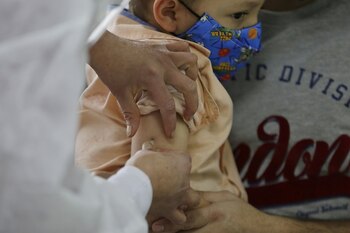
The Ministry of Health and Social Protection welcomed the recommendations of the National Committee for Immunization Practices, which indicated the need to change the biological one used to vaccinate against pneumococcus, thus moving from PCV10 to PCV13.
“The change of vaccine occurs because the scientific evidence provided by the Committee shows that the PCV13 vaccine has a greater spectrum of coverage against the different serotypes of bacteria that cause pneumococcal disease,” explained Germán Escobar, Deputy Minister of Public Health and Service Delivery.
He stressed that, although immunization with PCV10 has been effective, not only in Colombia, but in other Latin American and Caribbean countries, the decision is made in order to reduce any risk of serotype disease that is guaranteed to be covered by PCV13.
The epidemiology of pneumococcus is dynamic and that is why conjugate vaccines against this bacterium are very useful to reduce the incidence, due to the serotypes included in each of them.
Serotype turnover is a biological phenomenon present in all countries, which has been observed with the introduction of conjugate vaccines. “When the infectious agent finds protection, it looks for ways to mutate, which affects the severity of the disease and antimicrobial resistance,” he said.
The official added that the change of biological does not imply a change in the application of this, which is maintained for 2 months, 4 months and 12 months after the person was born.
In addition, he specified that, if the minor started his vaccination schedule with PCV10, he must end it with that same biological, since there is no conclusive evidence that indicates the convenience, possibility and low risk of combining different biologics. Therefore, it calls on vaccinating IPS to only administer the PCV13 pneumococcal vaccine for new schemes.
It should be noted that pneumococcus is a disease of the respiratory tract, caused by the bacterium Streptococcus pneumoniae (streptococcus), so the different types of diseases developed by this bacterium include infections, meningitis and pneumonia. That is why the vaccine is recommended by the health sector, because of its effectiveness in reducing the risk of complications or hospitalization, especially for the most susceptible populations.
“Based on capsular antigenic differences, more than 90 serotypes have been identified, a limited number of which cause invasive pneumococcal disease. The identification of serotypes has varied according to geographic region, age and period of study; 6 to 11 of the most common serotypes cause approximately 70% of all invasive infections in children in the world,” evidenced the Pan American Health Organization (PAHO).
According to PAHO, pneumococcus is the second most community-acquired pneumonia (CAP) agent that requires hospitalization, after Respiratory Syncytial Virus (RSV). He also assured that more than 95% of all episodes of clinical pneumonia and more than 99% of deaths from pneumonia suffered by children under 5 years of age worldwide occur in low- and middle-income countries. At the same time, in these countries, acute respiratory infections such as CAP are the leading causes of hospitalization and death in children under 5 years of age.
In the case of the Americas, the organization estimated the incidence of pneumococcal infection at 358 cases per 100,000 children (301-441) in 2015 and to see pneumococcus caused 5700 deaths. He highlighted that since 2000 the pneumococcal conjugate vaccine (PCV) has been introduced in the Region, and by December 2019, 37 countries and territories in the Region already have one of the two pneumococcal vaccines in their regular programs.
Keep reading:
Últimas Noticias
Debanhi Escobar: they secured the motel where she was found lifeless in a cistern
Members of the Specialized Prosecutor's Office in Nuevo León secured the Nueva Castilla Motel as part of the investigations into the case

The oldest person in the world died at the age of 119
Kane Tanaka lived in Japan. She was born six months earlier than George Orwell, the same year that the Wright brothers first flew, and Marie Curie became the first woman to win a Nobel Prize

Macabre find in CDMX: they left a body bagged and tied in a taxi
The body was left in the back seats of the car. It was covered with black bags and tied with industrial tape
The eagles of America will face Manchester City in a duel of legends. Here are the details
The top Mexican football champion will play a match with Pep Guardiola's squad in the Lone Star Cup

Why is it good to bring dogs out to know the world when they are puppies
A so-called protection against the spread of diseases threatens the integral development of dogs




